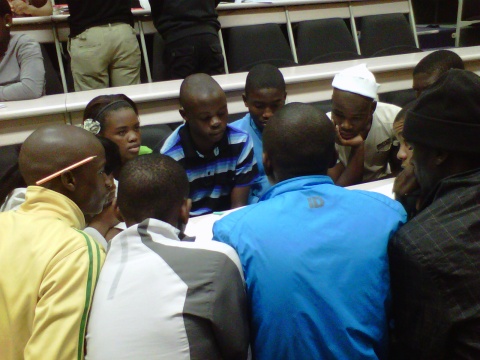
The hallway was buzzing and excitement filled the air as learners from Umlazi and Chesterville branches gathered outside Durban University of Technology’s ( DUT) passages of the library basements.
It was a mixture of old and new learners as well as old and new tutors all waiting in anticipation for the official start of Winter School. With the first half of the day dedicated to academic/tutoring activies and the latter to activities, fun and learning were definitely on the cards for the week.
This was the perfect opportunity to introduce our Reading Corner initiative, the brainchild of our Branch Assistant Cheryl Nzama. Having collected books from friends as well as a generous loan by the Umlazi AA Library ( where IY Umlazi is based ) we had a large box of books to spread amongst all learners from both branches. The aim of our book corner is not only to get learners interested in reading but also to enhance their English reading and writing skills.

Tuesday saw the arrival of the Answer Series books which IY learners over the years have used during Homework and Saturday Sessions as well as for preparation for exams. All this is possible through the kind sponsorship of The Answer , who provide these study guides for all our learners across the grades.
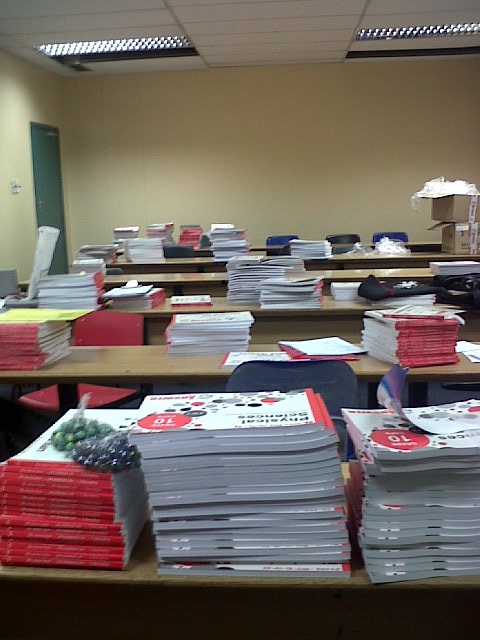
A lot of Grade 11 IY learners count Wednesday as their favourite day week 1. This is because Durban University of Technology‘s Chemistry lab ( through the assistance of senior Lecturer and Lab Assistant Mr Roy Nursagh donated half of the morning ( and some of their staff members ) towards doing various Chemistry practicals with learners – a great fete as most learners are in schools who are not equipped with Chemistry labs and only depend on their textbooks to study. Learners had the chance to do four different experiments as well as watch a presentation by Mr Roy for two other experiments.
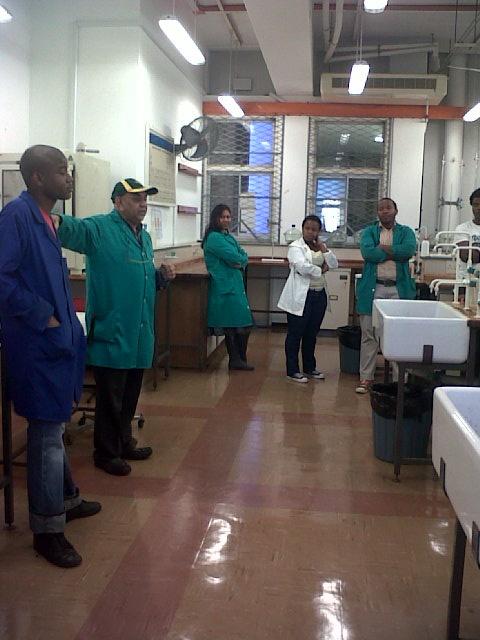
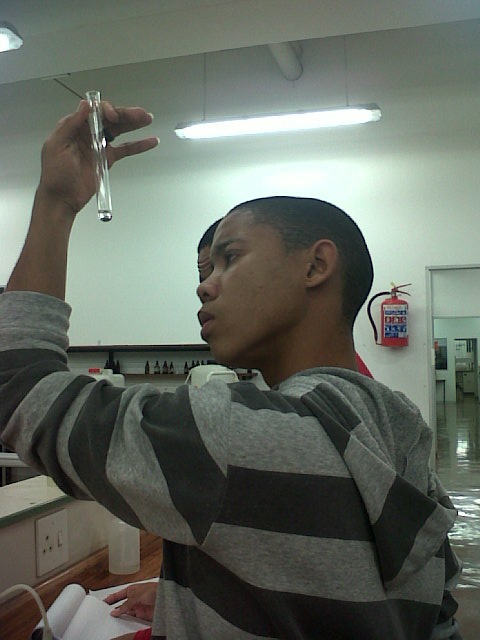
The two branches went their separate ways on Thursday for Operation Clean Up, an initiative aimed at encouraging environmental awareness and offering the learners an opportunity to back to their environment . Early in the morning Chesterville learners met up at the Vuyani Nkosi Memorial Centre where IY Chesterville is based and cleaned up the Chesterville Hospice, the main road ( Mahlathi Road ) as well as the St Anthony’s Church’s Mission which houses old aged as well as abused women and children.
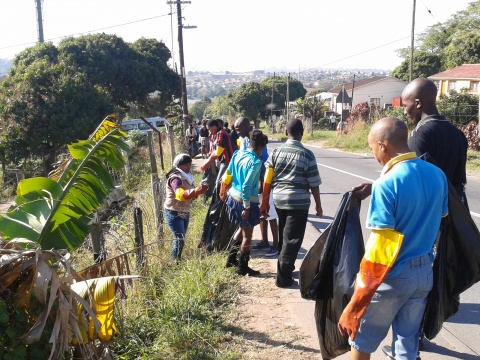
Through the assistance of Chesterville’s Area Based Management ( ABM ), Durban Solid Waste ( DSW ) donated plastics, gloves as well as an Environmental Bus and guest speaker for the event was Mr Njeba while Ethekwini Municipality’s Parks, Recreation and Culture donated tools used to clean up the yard. Both companies were also kind enough to sponsor 2 trucks and 4 municipal workers that picked up the litter collected by learners as well as the rubble from the mission.
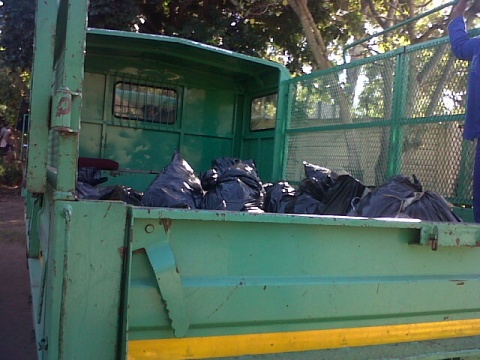
Friday, learners were combined and then separated into 4 groups : Yellow, Green, Blue and Red which were The Peacemakers, Ingqungqulu, Blue Bullz and Umlilo respectively.
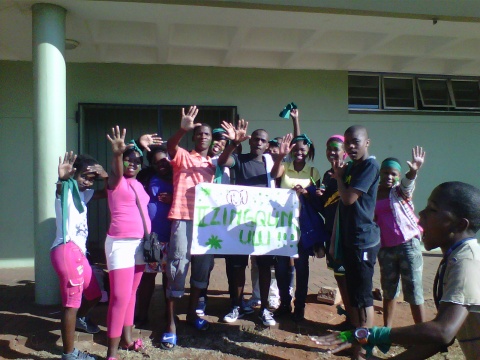
This was for our set to be annual event : Sports Day, an idea brought about by our Umlazi Branch Coordinator S’bonelo Cele.
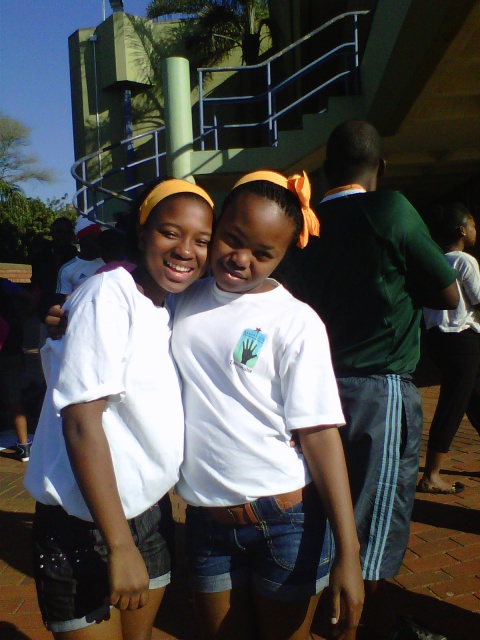
Various games such as Soccer, Netball as well as 100m, 400m and 400m Relay races and indigenous games such as Hopscotch, Amagende, Sprite and uShumpu were played and saw The Peacemakers ( Yellow ) walk away as the official winners of the event having collected the most points. ABI were the proud sponsors of this event which they also dubbed their CSI Day. Read more about the day here.
HSRC: Challenges and opportunities in addressing youth unemployement seminar
What way forward?
IkamvaYouth was invited for the HSRC seminar that was held via video conference in the three major cities of South Africa (Tshwane, Cape Town and Durban). The Durban seminar was attended by Thabisile Seme (Regional Co-ordinator for KZN) and Cheryl Nzama (Branch Assistant: Chesterville branch). The Seminar took place at the HSRC Cato Manor offices near the Chesterville branch and the ikamvanites received a warm welcome from the HSRC staff.
The opening speaker for the Seminar was Dr Monde Makiwane who discussed the “youth bulge”, a phenomenon that South Africa currently faces. He explained the youth bulge phenomenon as being the “result of the cohort of young people and prime-aged adults increasing at an alarming rate –and this is not caused by the high teenage pregnancy rate S.A has but by the fact that more people were born during the early 80’s & 90”s – and since S.A is a developing country, the high unemployment rate is associated with the youth bulge.
The second speaker, Dr Miriam Altman, discussed key challenges linked with youth unemployment. The seminar raised the question of how the government and South Africa at large are to tackle the high unemployment rate that mostly affects the youth.
There are a lot of factors that affect the high unemployment rate of South Africa however the youth needs to stop relying on the government and take matters into their own hands and go out there and want that better future for themselves and families too. The right attitude always leads you to your goals undoubtedly!
Click on the following links to access the presentations:
youth_bulge_presentation.pdf
youth_employment_-_altman_-_june_13_-_2012.pdf
Cheryl Nzama
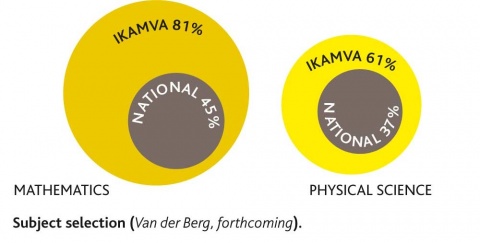
IkamvaYouth is pleased and proud to announce the publication of Against the odds: An evaluation of the IkamvaYouth programme, by a team of economists at the University of Stellenbosch. Servaas van der Berg and his team conducted an in-depth evaluation of IkamvaYouth, by administering questionnaires and interviewing 828 ikamvanites (past and present).
The full report is available here for download, and contains a wealth of information, results, analysis, quotes from ikamvanites and recommendations for improvements and scale.
Some of the findings have validated the results we’ve reported via our own tracking (see below). However, there were also some new and interesting findings, including:
- Insight into ikamvanites’ wealth and living standards
- Only 38% of ikamvanites live with their parents; 45% sometimes go to bed hungry; only 31% have their own desk or table at home and 65% have their own bed.
- 22% of mothers have matric and 11% have some post schooling
- 15% of fathers have matric and 9% have some post schooling; 32% of fathers’ education levels are unknown
- Matric results as compared with those of our feeder schools
- Detail regarding learners’ choosing Maths and Science and their performance in these most-challenging subjects
- “An overwhelming majority (81%) of Ikamva students in 2011 elected to do Mathematics, versus less than half of all candidates nationally. For Physical Science too, far more Ikamvanites chose this difficult option. Reponses to the survey indicate that similarly high proportion of former Ikamva students had elected these two subjects: 78% wrote Mathematics and 54% Physical Science.”
- “The difficulty of these subjects can be gauged from the fact that nationally, the pass rate (at 30%) is 46% and 53% for these two subjects respectively, much lower than for other electives such as Geography (70%) or History (76%), despite the fact that the candidates in these first two subjects are a far more select group in terms of academic ability. This ambitious subject choice is even more exceptional when compared to learners from similar (mainly township) schools. Ikamva’s encouragement of learners to take these more difficult subjects necessarily affects the relative pass rates and the subject performance of Ikamva learners negatively, thus the need to carefully consider this when evaluating Ikamva learners’ results.”
- “61% of all Ikamva matric candidates wrote and passed Mathematics, as against only 21% for all South African matric candidates.3 The proportion of all Ikamva matric candidates who achieved 40% or more was 28% versus 14% for all South African candidates. Compared to similar communities the Ikamva performance in this regard would even be more impressive than this.”
- ” What Ikamva thus successfully manages to do is to encourage learners from across the ability spectrum to raise the bar, by entering for subjects which the typical student from weak schools would usually avoid, and then to achieve success which is at least comparable to that achieved by candidates that often are more selected in terms of ability and from higher socio-economic groups. This is a truly impressive achievement.”
- The good results are consistent: “average results differ little between branches”
- The programme is very highly regarded by our learners and ex-learners (they do tell us these things, but it means a great deal more when told to independent evaluators)
- “The evaluation team is confident that Ikamva’s short term impact is considerable. This lies not only in the improved matric performance, but even before that in helping to create an environment where children from often very disadvantaged circumstances feel a sense of belonging and that someone cares about their needs and ambitions. That alone is a very valuable contribution. The extent of this contribution cannot be measured, but is visible in the fact that Ikamva was so highly praised by all who participates in it, or have done so in the past. As an evaluation team we have not seen such universally high praise of an organisation before.”
- Insight into the “success factors” behind the IY model
- “The remarkably successful personal relationships that Ikamva has developed with participants, based on extremely sensitive interaction with learners, yet without undermining basic discipline: “Kickouts” still occur and learners know that they can only remain part of the “family” if they play their part.”
- The tutors: “They are largely volunteers and mostly young. The fact that many of them are former Ikamvanites say something about the glue that holds Ikamva together: A positive social context in an environment where many face harsh circumstances at home, in the labour market, schools, universities, and wider society. The link with Ikamva means much to them, and also provides some continuity in their lives. Also, they act as role models to learners, thus further strengthening the desire of learners to undertake tertiary studies. Their relative youth also means that communication with learners is easier, in contrast to what learners experience at school. The team found no evidence that the tutors were particularly well trained or that they were always much better teachers than those in schools; the commitment, positive interaction and additional time were apparently most important in the success of students, not the better teaching.”
- “The fact that Ikamva operates in metropolitan environments where there are universities close by is an important factor in its success. Without a strong volunteer base, the tutors would not have been available, and it would have been more difficult to build the passion for tertiary studies that drives many Ikamvanites.”
- “The most important factors in Ikamva’s success, however, appear to be its commendable organisation, good planning and the enthusiasm of those at the head of the organisation. This enthusiasm is contagious.”
- Matric results
- “85% of Ikamva candidates passed, against the 70% nationally, or put differently, that Ikamva’s failure rate of 15% was half of the national average. But the full extent of Ikamva’s performance success is not yet captured in simple pass or fail rates: What is quite impressive is Ikamva’s performance in terms of getting learners access to universities: 36% of Ikamva candidates, versus 24% nationally, obtained a so-called “Bachelor’s degree endorsement”, i.e. a pass that is considered by the Department of Basic Education as good enough for degree studies. This is what used to be referred to in the past as “university exemption”. Data on a race basis is not yet available for 2011, but to put the Ikamva performance in terms of potential university entry in perspective, it is worth considering that the proportion of black students who obtained such exemptions in 2007, the last year for which race data could be obtained, was only around 11%. Altogether 72% of Ikamva candidates passed with either Bachelor’s or a Diploma endorsement, i.e. could potentially attend a university for degree or diploma studies (some universities have stricter entry criteria, though), whilst this proportion is only 53% amongst matric candidates nationally.”
- Placement into post-school opportunities
- More than half of respondents who had matriculated whilst participating in Ikamva after matriculating (58% of the 119 such respondents in the survey) indicated that they had gone onto university studies, and another 14% that they had continued onto “college” (here interpreted fairly broadly as other post-school studies). This thus left only 28% who had not gone on to further studies.
Key recommendations which we’re currently considering carefully include:
- Find ways to support learners as they adjust to life at tertiary
- “Ikamva could, and should, find ways of assisting students to make the transition to university, both by assistance with the initial exposure to academic English that many respondents to the qualitative interviews found daunting, and by helping them to find support structures to reduce the anomy that they experience when starting at university. Ikamva would have to decide how much of this it wants to engage in itself (which is not its core activity), and how much can be done by assisting Ikamvanites to link to other institutions (e.g. NGOs and university structures) that could assist.”
- Provide more support to build proficiency in Academic English
- Scale cautiously:
-
“Given how important Ikamva’s leadership is in its success, one may well argue that it would be extremely difficult to scale up the activities, particularly across many more centres. The evaluation team has indeed expressed its reservations about that in previous interaction with Ikamva: It is easy for leadership to under-estimate the importance of its own role. A dilution of this leadership across a much bigger organisation may lead to the programme losing some its attractiveness to students. On the other hand, analysis shows little difference in performance between branches. This could be interpreted as that the success lies in the model, and not in the particular leadership at branch level. This would be consistent with a view that expansion could be attempted as long as good branch leadership can be found. A cautious approach may be to consider expansion only when there are good support structures and where good branch managers are available, but not to be over-ambitious. The strong central leadership capacity that Ikamva possesses for planning and organisation is an asset that could be built on and that may offer a solid foundation for expansion, but it should not be endangered by too rapid expansion. Also, expansion should retain the essentials of the existing model, which importantly includes proximity to a university environment, preferably in a metropolitan area. This limits scalability, but such a conservative stance may be appropriate.”
IkamvaYouth is greatly appreciative to the Evaluation team (Nic Spaull, Ronelle Burger, Cobus Burger, Chris van Wyk, Servaas van der Berg, Robert Dzivakwi and the fieldworkers), ikamvanite Phillip Mcelu for tracking down 95% of all ikamvanites (!), DGMT for making this possible, and to all the ikamvanites who participated in the survey and interviews.

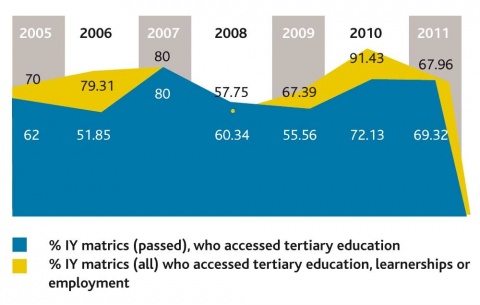
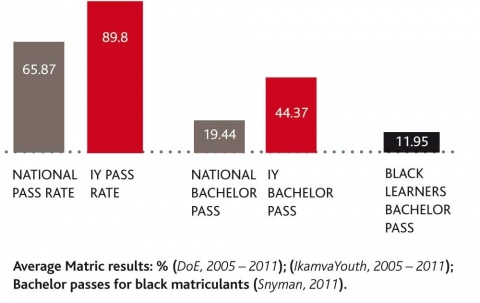
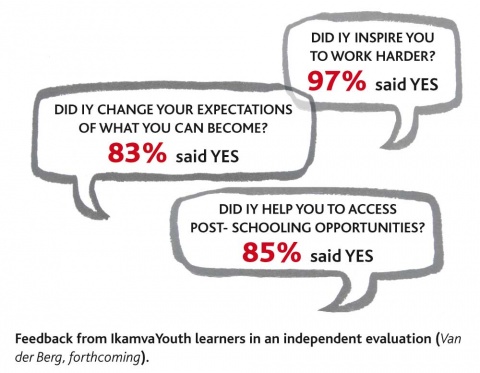
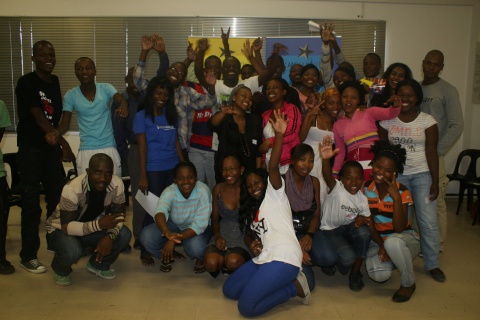

On the weekend of 31 March and 1 April IYKZN hosted it’s 2nd SPW at the Chesterville branch. We had the priviledge of being joined by our National Coordinator Zamo Shongwe and our Director and Co-Founder Joy Olivier, who was also present at last years SPW. Excitement and enrgy filled the centre as we were joined by tutors from both our branches – Umlazi and Chesterville. Unlike last year where the SPW took place after one of our Saturday School sessions, we had a full 2 days to spend planning 2012 and going over 2011 with those that joined during the year as well as addressing ways of improvement that could be implemented.
A mixture of new and old tutors gave us a chance to discuss the growth of IYKZN over the years and all our achievements till now. New tutors and learner reps got a chance to contribute their thoughts and participate in an active conversation about IY’s plans for 2012 while learning from those who have been present over the years. This meant that most of day 1 was spent around understanding IY and our mission and values as well as recognising our achievements. New members also had the chance to contribute towards our budget, enforcing our open door policy to all those present.
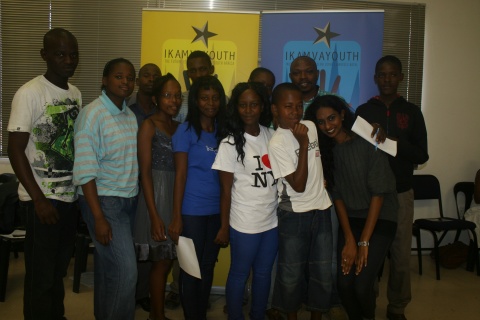
Day 2 began with our previous Branch Comm going through each of their portfolios and the success of 2011 within each portfolio. Thereafter we had a chance to listen to motivations by group members who were present and interested in forming 2012’s new Branch Comm. Which was very heartwarming as a few learner reps also stood up and shared their interests. Though there are now 2 branches, seems like both Branch Comms are a passionate group of people who are committed to passing forward love and knowledge to all future Ikamvanites. Overall, our SPW was a great success filled with love and laughter as we used fun and games to bond and shared our thoughts in an inviting circle of acceptance filled with individuals with a common love and goal for Ikamva KZN. To LIFT AS YOU RISE!!
Follow the link to read the full report: strategic_planning_weekend_report_-_kzn.pdf
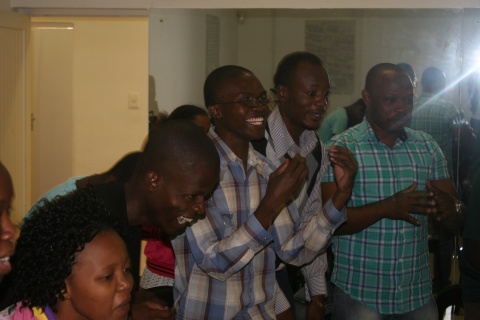

IkamvaYouth learners from township and rural schools achieve 85% pass rate; 42% of which are bachelor passes.
“Today my life begins and I’m so happy” – Anathi Malindi, Grade 12 learner from Nyanga.
Speaking on SAFM on 4th January, Graeme Bloch said that “you have to go to a model c school if you want to do well in matric”. And although the country is celebrating the 70.2% national matric pass rate, analysts agree that this figure masks the inequalities in achievement and access to tertiary study. With learners at township and rural schools severely under-performing, it appears that the higher the school fees the better one’s chances of academic achievement.
Yet IkamvaYouth’s volunteers and learners have once again shown that excellent results are possible, irrespective of which school one attends. There were 100 Grade 12 learners enrolled at IkamvaYouth in 2011, and of the 85% that passed, 42% obtained bachelor passes. This is remarkable given that only 24.3% bachelor passes were achieved nationally; the far majority by ex-model c schools. Two Western Cape branches with their first grade 12 classes did particularly well (Masiphumelele achieved 96% pass; Nyanga 93%), and the Ivory Park branch led the pack with a 100% pass rate). Overall, 70% of learners have achieved the bachelor or diploma passes they need to access tertiary education.
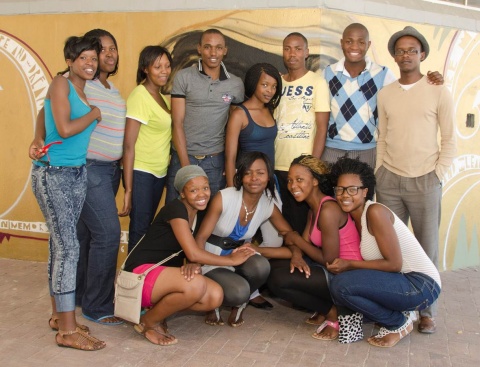
Matriculants at Makhaza Branch, Khayelitsha
IkamvaYouth sets no academic pre-requisite for enrollment in the programme. Most learners join with abysmal academic results and are from impoverished homes with unemployed caregivers. During their time with IkamvaYouth, learners dramatically improve their results, access tertiary education, and as Portia Dlamini’s mother in rural KZN hopes, will be able to “carry the family out of poverty”. Many ikamvanites excelled (25 distinctions overall) and – most importantly – many showed significant improvement. “When I joined IkamvaYouth, my third highest mark was 64%, and today I’ve achieved 5 distinctions”, said Shelton Chadya from Ivory Park. Tshepo Lesejane effectively doubled his maths literacy result (39% when he joined; he matriculated with distinction).

Gauteng Branch celebrating Matrics with Branch Coordinator Joe Manciya
Although celebrating the results, IkamvaYouth’s work with the class of 2011 is far from over. 80% of the learners who failed are eligible for supplementary exams, and tutors will ensure that they’re ready to succeed in these exams in March. While many of those who passed have already been accepted by the country’s top universities, there is still work to be done to ensure that none of the class of 2011 become unemployed. The next step is ensuring that all these learners access tertiary education, training, internships, learnerships or employment. “IkamvaYouth will continue to support all our 2011 matrics as they access quality post-school opportunities and become tutors; enabling the following years’ learners to do the same,” says director Joy Olivier.
The tutors who help the learners to reach these heights are all volunteers. Most are university students and many are ex-learners from IkamvaYouth. They’re also the organisation’s greatest benefactors: next year, ikamvanites will be delivering the equivalent of over 3 million rands’ worth of tutoring time to learners in seven communities in three provinces. The result of this phenomenal investment is an intensive, high quality programme that offers ongoing individual attention and support to learners for under R4500 per learner per year.
As well as our volunteers gratitude must be extended to our funders and donors. In particular IkamvaYouth is especially grateful to the DG Murray Trust, EMpower, the Raimondo Trust, the Potter foundation, the Answer Series, ABI, Hatch, African Bank, Cato Manor ABM, AME Africa, the Anglo Chairman’s Fund, SEF, TSiBA, UWC, DUT, Department of Libraries and Information Science, Learning Trust, Bertha Foundation, Dietschweiler Stiftung, the Foschini Group, iKineo, Education Without Borders, World Teach, Zonke Monitoring Systems, and Capitec Bank for their vital contributions this past year. A great shout big shout out also goes to the countless individuals whose time and money has ensured that IkamvaYouth not only continues to operate in challenging economic times, but can grow and expand its reach and impact.
When announcing the results, the Minister of Basic Education pronounced the eradication of inequality a national priority. IkamvaYouth invites everyone to get involved in transforming our nation, one shining future at a time. IkamvaYouth has branches in the Western Cape (Khayelitsha, Nyanga and Masiphumelele); KZN (Chesterville and a new branch opening in Umlazi) and Gauteng (Ivory Park, and a new branch opening in Ebony Park). IkamvaYouth has maintained a matric pass rate of between 83 and 100% each year since 2005, and true credit for these results must go to the learners, volunteers, the branch teams, and the donors.
Congratulations Class of 2011!

On the weekend of the 5th and 6th of March IYKZN hosted it`s first SPW. This was an honour especially due to the presence of Joy Olivier. The two days were very productive. Team spirit was high and energy was immense.
Over the two days the KZN Team of IkamvaNites discussed everything that the organization is planning for the learners in 2011. From new Branches to Branch comm members. The weekend started out as a normal tutoring Saturday, but after the lessons, than the really fun stuff began. First we discussed the fundamental issues to be covered in the SPW. Things like getting all the volunteers to fully understand what IY is and what it`s values are, what it stands for and it`s glorious and sometimes challenging history.
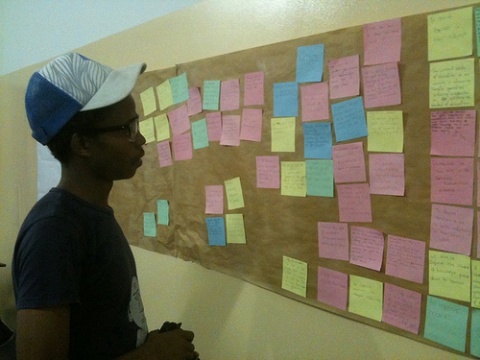
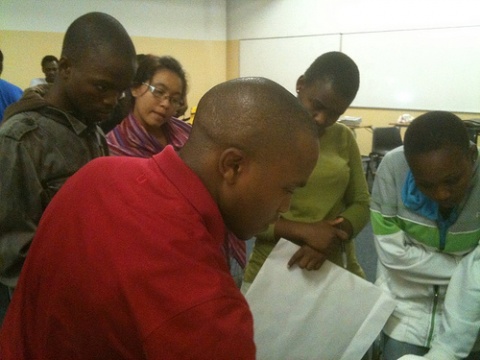
We went on to discuss the various Branch comm codes(a minor change was made) and elect Commitee members. Many great ideas were brought up in this beautiful meeting. Ideas for the winter school programme, to improve productivity and boost creativity.
All In all,strategic_planning_weekend.pdf the weekend was amazing, the list of things we achieved was just overwhelming. The most interesting bit was when one of the learner reps confessed to believing that the tutors are heartless monsters, (lol) now she understands that they are very nice people who just want to help her. (lol too cute if you ask me :*) )
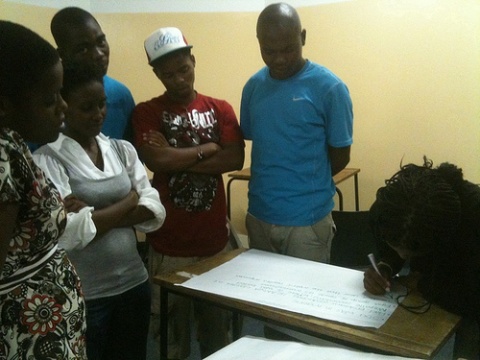
In conclusion, i would like to declare that IYKZN this year is aiming very high ( especially since we are opening a new branch with a 20-computer computer lab in Chesterville , in the words of Khona WHOOP WHOOP LOL ) and if the energy of the SPW is consistent we will achieve loads.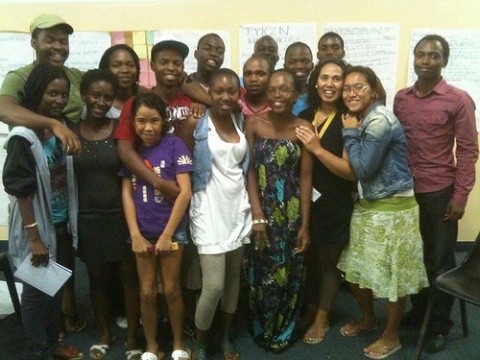
IkamvaYouth KZN : LIFT AS YOU RISE . . .
SPW Minutes spw_kzn.pdf_.pdf

























 Lloyd Lungu
Lloyd Lungu